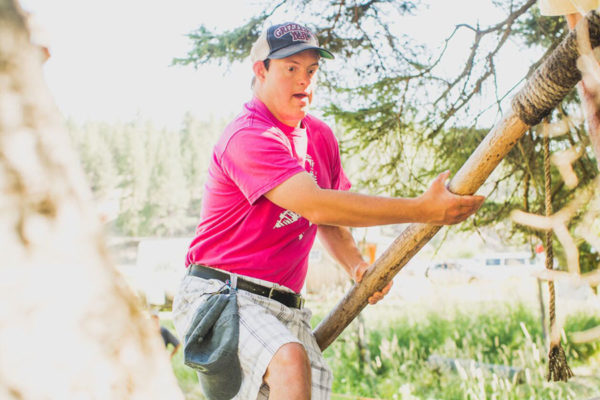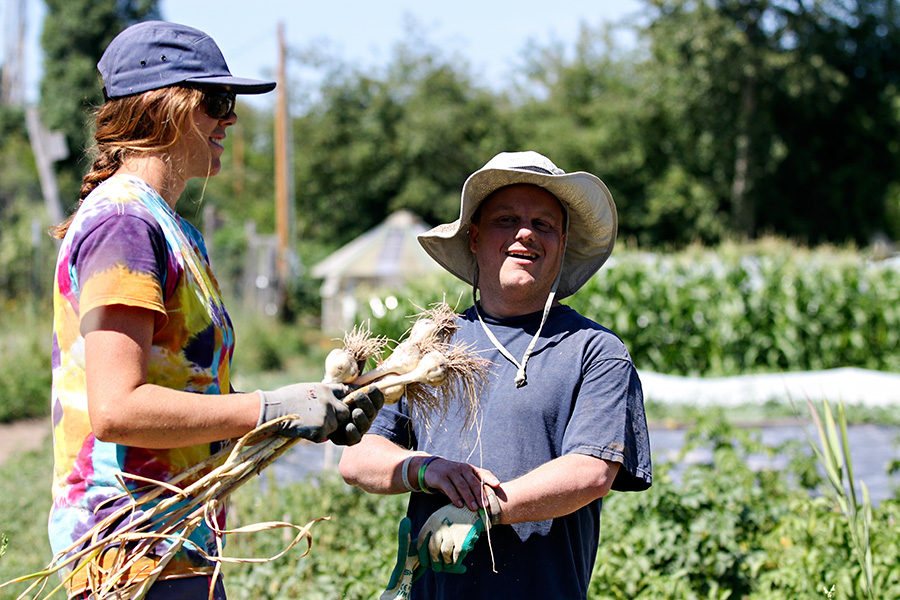Alec Howell has ambitions of becoming an actor, but on a recent summer day in the Flathead Valley, he found work as a farmer.
Howell, 26, of Whitefish, was born with cerebral palsy, a congenital brain abnormality that impairs his movement and muscle control, but that doesn’t stop him from dispatching the lengthy list of tasks that need to be carried out on any given day at Centennial Farm in West Valley, nor does it impede him from delivering spot-on impersonations of well-known characters from popular television shows like “The Simpsons,” “Family Guy” and “Full House.”
And while he’s committed to realizing his dream as a voice actor, Howell says rolling up his sleeves and laboring among hay bales and slash piles in the afternoon sun is gratifying in its own right — it reveals new possibilities and teaches him to overcome challenges.
“I have CP, but I’m not disabled,” he said. “I’m able. To make it big, it takes dedication and hard work, and we learn that out here.”
“That’s right,” Centennial Farm owner Les Keller chimed in. “Nobody here is disabled. We focus on our abilities. We focus on being able.”
Each week for nearly five years, Keller has been showing groups of men the scope of their abilities on his 500-acre farm, where they chop firewood, stack slash, harvest vegetables, drive tractors, troubleshoot small engines, and take on the scores of other chores that crop up on the farm.
As an early participant in the Flathead Valley’s Care Farm Program, and a third-generation farmer, Keller understands the inherent health benefits — both mental and physical — of being outdoors and working hard to accomplish something tangible, like growing food or raising livestock.
The Care Farm Program allows participants like Dustin Frey, who lives with Down syndrome, to work outside of a clinical setting or indoor environment and reap a connection to social support, meaningful work and the natural world.
“I do everything,” he said. “I chop wood, drive the tractor. Everything.”
It allows participants like Michael Jones, who lives with developmental disabilities and is blind, to harvest garlic alongside Raven Ridge Farm owners Nathan Christianson and Cassady Daley, and their dog Willa.
Keller’s farm is one of a growing number of care farms in the Flathead Valley — there are about a dozen — aimed at providing a farm-based form of empowerment to people with special needs, including those living with developmental disabilities, traumatic brain injuries, dementia, and depression. Care farms are places where members of society’s most vulnerable populations join farmers in working the land, reaping a connection to social support, meaningful work and the natural world.
Rachel Grant, program supervisor of the Care Farm Program, which is offered by the Kalispell-based statewide homecare provider A Plus Healthcare, said the therapeutic day-farming program provides an empowering and evidence-based form of health care for folks with developmental or physical disabilities, while also breaking down barriers that alienate different populations.
“It’s about using nature-based programs to empower the discovery of their strengths, build social connections and give of their own talents in a productive capacity,” she said. “I see this program as not only giving clients an opportunity to participate in our community, but also teaching our community to interact and embrace people with disabilities or other special needs. Exposing the population to people with special needs makes us all more aware and tolerant. I believe it is helping to make the world a better place.”
The Care Farm Program was the brainchild of Dutch transplant Maarten Fischer, who moved to the Flathead Valley from the Netherlands, a region where therapeutic farming is a prominent practice, as well as a $5 million industry. Last year, the Care Farm Program earned a 2016 Exemplary Program award from the Montana Community Services Bureau and the Department of Public Health and Human Services’ Medicaid Home and Community Based Services program.
Having grown the program from the ground up, Fischer now hands the reins over to Grant, who said care farming is a healthy alternative or addition to traditional in-home care or clinical treatment.
Farmers like Keller and his son Kline undergo training to become part of the program and devote significant portions of their time to the work. They’re paid a stipend to host clients, many of who are referred through Medicaid caseworkers.
The program has also partnered with the Center for Restorative Youth Justice, Opportunity Resources, Lighthouse Christian Home, Flathead County Agency on Aging, Montana Vocational Rehabilitation and Blind Services, and the Flathead Job Service to expand care farming’s reach.
Farms are rich places to hone any number of skills, Keller says, and in some cases work through the Care Farm Program amounts to the only job experience participants have had. In other cases, the farm is the first workplace where they’ve experienced affirmation of their humanity and dignity regardless of their capacity.
Being outdoors and working in a beautiful setting can make a big difference, Grant noted, and research suggests that the amount of time spent outdoors can significantly reduce the amount of caretaking a person requires. The high level of medical care many clients receive can be alienating, she said, and many feel they have escaped when they visit a farm.
On July 29, Grant and Keller helped direct the Care Farm Challenge, an obstacle-course race fashioned after the popular Spartan Race, and adapted for people with special needs. The event was held at Keller’s Centennial Farm, and the course — complete with creek crossings, climbing and balancing obstacles, and even a zip line — was entirely designed and built by Care Farm participants.

The free event drew around 70 participants, who reveled over their accomplishments afterward over a barbecue lunch.
“This is the culmination of a year spent celebrating our abilities,” Keller said.
For more information on the program, contact (406) 752-3697, ext. 2004, email [email protected] or visit https://montanacarefarming.com.
